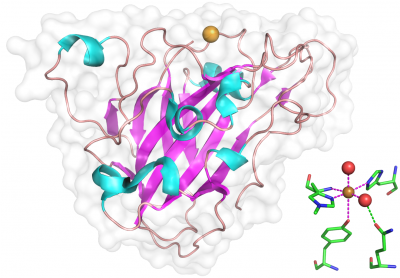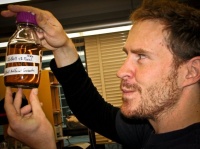CAZypedia celebrates the life of Senior Curator Emeritus Harry Gilbert, a true giant in the field, who passed away in September 2025.
CAZypedia needs your help!
We have many unassigned pages in need of Authors and Responsible Curators. See a page that's out-of-date and just needs a touch-up? - You are also welcome to become a CAZypedian. Here's how.
Scientists at all career stages, including students, are welcome to contribute.
Learn more about CAZypedia's misson here and in this article. Totally new to the CAZy classification? Read this first.
Help:Images
CAZypedia generally contains two types of image placements in pages:
- Simple pictures without borders or frames, as found on CAZypedia Contributor pages, and
- Figures with legends, as found on various content pages, e.g. GH Family pages.
This page describes how to add an image to a page to maintain a constant "look and feel" across CAZypedia.
Uploading an image
The first step in adding an image to a CAZypedia page is to upload that image to the wiki. This is done through the Special:Upload page, which can be accessed from any CAZypedia page via the "Upload file" link in the "Toolbox" section of the left menu.
- Go to the Special:Upload page.
- Click the "Browse" button to locate the image file on your computer.
- Change the "Destination filename" to something sensible, if it is not already.
- Adding a summary can be helpful (image source, content, author, etc. Do not upload copyrighted material without permission.).
- Click the "Upload file" button at the bottom of the page.
- Make a note of your uploaded image's filename, as you will need this exact name to add the image to a page.
Note: If you forget the filename, uploaded files can be found via one of these two pages:
Adding an image to a page
Contributor (User) pages
To insert a simple image without a frame nor border, as in the example to the right:
- Copy and paste this wiki code to your page:
[[Image:filename.png|200px|right]] - Change "filename.png" to the filename of the image you wish to include.
Notes:
- "200px" specifies the image width in pixels. This is CAZypedia's standard width for. Only in exceptional cases should this be altered.
- "right" places the image on the right side of the page. Again, this a CAZypedia standard.
Content pages
- Copy and paste this wiki code to your page:
[[Image:filename.png|thumb|400px|right|'''Figure X.''' Figure legend.]] - Change "filename.png" to the filename of the image you wish to include.
- Change or delete the figure number and adjust the figure legend.
Notes:
- "thumb" specifies that the image should be rendered as a thumbnail,
- "400px" specifies the image width in pixels. In general, this default value is a useful standard that can be adjusted in limited cases, e.g. for wide horizontal figures. In general, is is best to keep figures less than 1/3 of a page wide at normal screen resolutions.
- "right" places the image on the right side of the page. This a CAZypedia standard.
- Figure legends can be very sophisticated, including links to internal and external pages, as well as references, as shown in the example of Figure 1. You may open this page for editing to view and/or copy the wiki code in this example.

- Quinlan RJ, Sweeney MD, Lo Leggio L, Otten H, Poulsen JC, Johansen KS, Krogh KB, Jørgensen CI, Tovborg M, Anthonsen A, Tryfona T, Walter CP, Dupree P, Xu F, Davies GJ, and Walton PH. (2011). Insights into the oxidative degradation of cellulose by a copper metalloenzyme that exploits biomass components. Proc Natl Acad Sci U S A. 2011;108(37):15079-84. DOI:10.1073/pnas.1105776108 |
- Harris PV, Welner D, McFarland KC, Re E, Navarro Poulsen JC, Brown K, Salbo R, Ding H, Vlasenko E, Merino S, Xu F, Cherry J, Larsen S, and Lo Leggio L. (2010). Stimulation of lignocellulosic biomass hydrolysis by proteins of glycoside hydrolase family 61: structure and function of a large, enigmatic family. Biochemistry. 2010;49(15):3305-16. DOI:10.1021/bi100009p |
